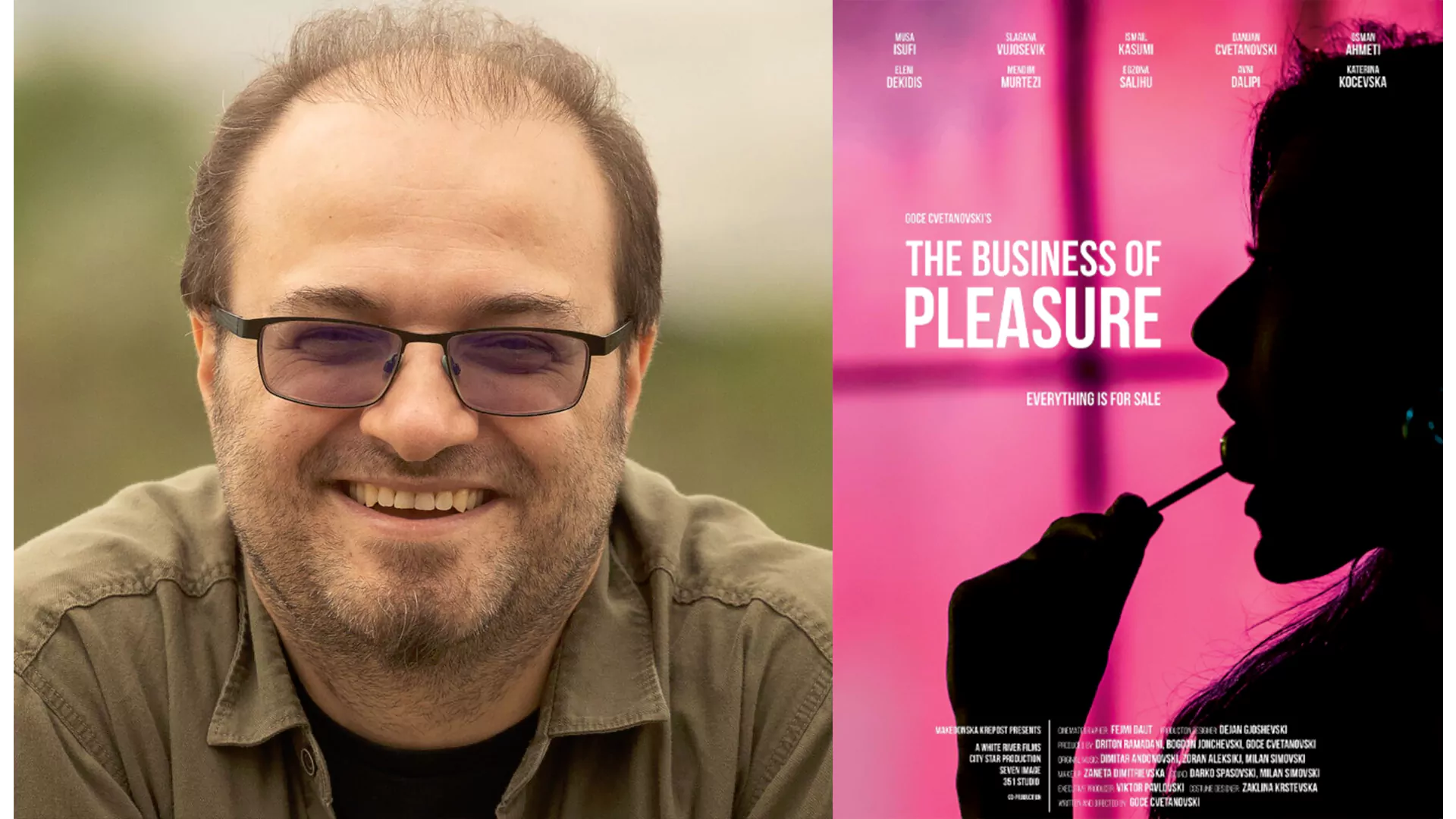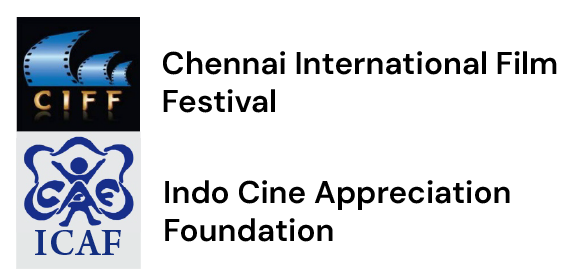
Inner Strength and Creativity Make a Good Director: Dir. Goce Cvetanovski
Director Goce Cvetanovski (Instagram: @gocecvetanovski) of the movie ‘BUSINESS OF PLEASURE’ shown at 21st CIFF tells Ms. Divya Jay (Facebook: @djwritings) from Team 21st CIFF about he feels to be the first Director to represent Macedonian cinema at our film festival and how he can watch some movies infinitely, and not get bored!
Tell us about your background
I come from an artistic family – my father was a documentary filmmaker, and both my uncles were theatre artists; one as a playwright, the other as a director. My grandmother used to always tell me fairytales and I was fascinated by the strange beings that inhabited in these stories. I started inventing characters and stories very young. This love for storytelling later refined into love for filmmaking.
When did you decide to make ‘BUSINESS OF PLEASURE’?
During my studies, we had an exercise to write a synopsis about a story that’s inspired by real-life events, something that we needed to find in newspapers. So, I found this story about sex trafficking from the Balkans to the Western countries that intrigued me. The script at the end had nothing to do with that article, but that’s how the idea for the ‘Business of Pleasure’ was born.
The initial title of the film was ‘The Day of the Woman’ and it was about two journalists who make a hidden camera reportage while infiltrating a sex trafficking ring. It was supposed to be a real-time story and to be a one-shot movie. Ten years later, I found the script in one of my boxes and decided that it’s worth revisiting.
Tell us about your favourite films.
I love cinema, whether it’s artistic films or pure entertainment, I enjoy being immersed in the magical world created by artists from all over the world. In my top ten directors there’s Stanley Kubrick, Sergio Leone, Federico Fellini, Akira Kurosawa, Hayao Miyazaki, Steven Spielberg, Quentin Tarantino, Ingmar Bergman, Peter Jackson and Guillermo del Toro.
What makes these filmmakers special to you?
Something in the way they tell a story. It’s hard to rationally explain, but I can watch their movies infinitely, and not get bored.
Would you be anything other than a director?
Unfortunately, yes! Until now I’ve always worked with smaller budgets than my artistic ambitions, so I often take on the role of the producer and editor. In my earlier shorts, I have also been driver, set decorator, boom operator! Whatever needed to be done and there was no one else to do it.
Should writer and director always be the same person?
Not necessarily, as long as there is mutual understanding and respect, and at least partial sharing of the vision for the project, then everything can work.
Would you direct a movie written by someone else?
Yes, if I like the story. There are many movies that when I saw them, I wished it was me who have directed them.
Would you write a movie which would have a different director?
Again, I have no ego problems. If a director wants to direct a screenplay that I have written, it’s a big success. That means another person has been attached to that story so strongly, that they’re willing to put a year or two of their lives into making it a reality. Recently I have sold a script, a serial killer thriller, that will be directed by another filmmaker.
Tell us about your filmmaking journey.
Officially I have started a film club named ‘Ed Wood Film Workshop’. We worked on no-budget movies and none of us knew anything about filmmaking. That’s where the name of the club came from.
I would say that this workshop was where I learned the most, because it was all practical knowledge. I continued making films and music videos during my studies, and practically, I can say that I haven’t had another job except in the film industry.
With time, I have made projects that had local and international success. Currently I’m finishing my second feature, and it’s Macedonia’s first animated feature. At this point of time, I consider myself a seasoned filmmaker, and I’m striving to produce movies that would be seen by the audiences worldwide.
Give us a background about your formal education.
I studied cinema in Paris, where I stayed for 17 years. I’m not sure how much influence the school programme had in my shaping. There were two professors however, that have given me tips and tricks that I’m still using. But in the long run, the degree is just a paper. It’s the inner strength and creativity that make a good director, and not the degree itself.
How did you start watching world films?
That was the best part of my education. We had an audiovisual library with films from all around the world. This was where I first learned about non-Hollywood cinema.
There were days where I would come to university only to watch films. In my first two years of learning, I probably watched more than 500 movies from international filmmakers. I’m sure they had a nickname for me in the library, because I was there all the time!!
Is support from friends and family necessary to become a filmmaker?
Definitely. In my case, I don’t think that I would’ve made it if my family and friends didn’t support me 100%. You often need to make personal and financial sacrifices on your artistic journey, and it helps to have people around you who love you and trust in what you do.
What’s different between short film and a feature filmmaking?
There is the same level of energy and creativity required, but with a short film you can’t make a living. As much as I love the short form storytelling, I have decided not to make short movies any more. On the other hand, I think every filmmaker should do at least a couple of shorts before venturing into the long feature production.
Tell us about the Macedonian cinema industry.
Recently, Macedonian cinema has a ‘nouvelle vague’, new filmmakers of my generation and younger, and is experiencing a dramatic rise in the international success of the films. We produce 3-6 feature films per year, and probably about 10-20 shorts.
These last two years, we’ve had Oscar nominees, Venice and Cannes selections, it’s really the best period in years. What I’m very happy about is, that the indie scene has started to gain attention by the audience.
This year there was an independent movie that became the most watched Macedonian movie in cinemas ever.
Would you make films in other genres?
Yes. I like to challenge myself, and don’t want to fall into repetitive patterns. Making always the same film is a big danger, sometimes even the biggest filmmakers fall into this trap.
If you could go back in time and become a popular filmmaker from the past, which filmmaker would you choose to be and why?
Haha. That’s a difficult question. I’d go for Steven Spielberg. He has spent his life on the films sets of some of the most loved movies ever, and was a pioneer in groundbreaking technologies that changed the filmmaking forever.
Who are your favourite Indian filmmakers?
Satyajit Ray. I fell in love with his movies when I discovered his works in the university’s audiovisual library. I think that I’ve seen all his films that were available at least twice in a short period of two weeks.
Somewhere in my student-time boxes there is a notebook where I was writing notes about the films that I’ve seen, what I’ve liked or even description of different shots and techniques used by directors. It would be interesting to dig them out now and to read them. I remember that with Satyajit Ray, I loved how he uses focus-shifting.
There was this one shot, sorry but I don’t remember from which movie it was: there was a man who was walking back and forth towards the camera, the camera was in high angle. It was a pure cinematic joy to watch. Last year I tried to rewatch his movies, but unfortunately, they were not available to buy or rent in Macedonia.
How similar are Indian movies from the kind you make.
Indian movies, the ones I know about at least, have strong local influence, a specific esthetics and most of all, very strong connection to the music and the dance. As I’m coming from half a world away, it’s normal that my movies have a different tonality. But the best thing in art is that it is universal: I don’t have to be Indian to enjoy Indian cinema, and vice-versa. We’re all humans after all, and this is a message that I hope is well presented in my work.
Movies from which country helped you during your journey of becoming a filmmaker?
When I was younger, it was definitely the USA movies, but later on during my studies I have discovered European, Asiatic and African cinema. To me, it’s not one language or one country that is crucial, but individuality of the filmmakers and the story.
How does it feel to be part of 21st Chennai International Film Festival?
I’m very happy for the film being selected. India is one of the biggest countries in the world, with rich tradition and culture. Having my movie recognized as a ‘worth to be watched and presented to the audience’ is a big honour. A big thank you to the selectors of the festival, and I’m sorry I couldn’t come personally. I hope there will be another chance.





